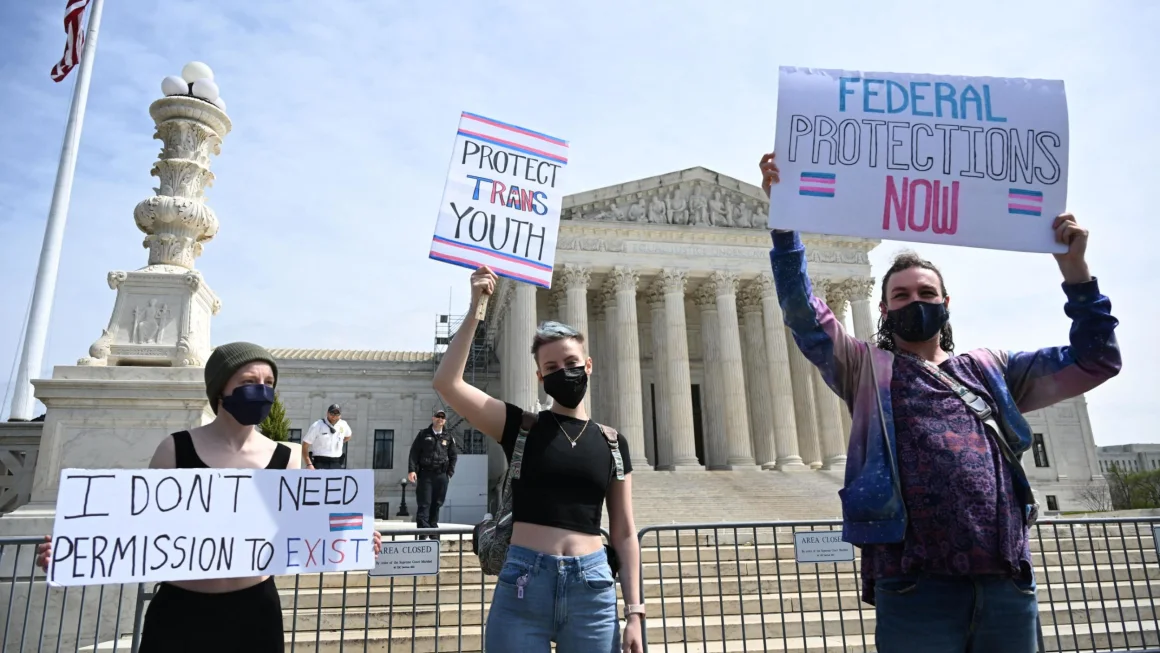As families of transgender children battle Republican-led states over a slew of legislation that limits access to gender-affirming healthcare for youth, the Supreme Court is under mounting pressure to intervene in the contentious issue.
From school toilet policies and sports restrictions to prohibitions on conversion therapy and other contentious issues, the high court has generally avoided getting involved in controversial cases involving transgender rights.
However, the patchwork of rulings made by lower courts in cases involving gender-affirming care could eventually lead to the court being involved in the matter for the first time. Four appeals involving lawsuits contesting three states’ bans on gender-affirming care for minors are now pending before the justices.
Last month, the court received an emergency request from Idaho officials seeking permission to impose the ban while a lower court challenges it. This was the most recent appeal to reach the court. The court may decide on the urgent appeal this week once both parties have presented their full briefs.
In response to challenges to state restrictions in Tennessee and Kentucky brought by trans adolescents and their families, together with the Biden administration, three further appeals were filed with the court in November, with each appeal arriving at the same time.
At their next closed-door meeting next week, the justices will finally get around to reviewing those prior appeals. The three petitions may sit for a while if the justices take their time reviewing them.
According to Tobias Barrington Wolff, a law professor at the University of Pennsylvania and an authority on LGBTQ rights, “These laws are punitive, and insofar as the court cares about impacts on people on the ground, these cases make out a very strong argument for taking the case.”
Conservative Justices Clarence Thomas and Samuel Alito have shown an eagerness to hear issues involving transgender Americans in the past, but they will need the support of two of their colleagues in order to bring the cases from Kentucky and Tennessee to their docket for next term.
According to the attorneys representing the transgender teens and their parents in the Idaho case, who are contesting the state law, the minor plaintiffs’ “gender-affirming medical care has dramatically alleviated their gender dysphoria and enabled them to become healthy, thriving teenagers.” Last week, the attorneys urged the court to reject the attorney general’s request.
Meanwhile, advocates for Idaho’s statute have hurried to the courthouse in the past few weeks to beg the justices to maintain the ban.
Six people who regret getting gender-affirming procedures in the past have petitioned the justices to remove the prohibitions, with over a dozen states joining them. The so-called detransitioners have warned that they were “harmed” by the care they had.
In their personal accounts, the individuals involved discovered that the interventions they had sought did not alleviate their gender dysphoria or mental health problems; rather, they suffered physical harm and experienced heightened emotional distress upon realising their bodies had been permanently changed due to a broken promise, as stated in the friend-of-the-court brief.
Individuals who identify as nonbinary or transgender can benefit from gender-affirming care, which is individualised and comprises a variety of therapies and approaches supported by evidence. Almost every major medical organisation recognises these forms of care as the gold standard, and they differ according to the patient’s age and treatment objectives.
Transformative and potentially life-saving surgical procedures can be an integral aspect of gender-affirming care, and studies have shown that individuals who undergo these procedures report high levels of satisfaction with their experiences. Underage patients should not have surgery. The court was informed by attorneys representing the Idaho law’s opponents that “treatment regret, due to detransition or other reasons… is extremely rare.”
One of the lawyers challenging Kentucky’s ban, Shannon Minter of the National Centre for Lesbian Rights, told AWN, “There’s such a clear circuit split now that I think it’s only a matter of time until they do feel compelled to take a case.”
“Now might be the time,” Minter chimed in. “I really hope it’s because these bans are causing terrible harm to these families and the negative decisions really can’t be reconciled with the Supreme Court’s precedent.”
